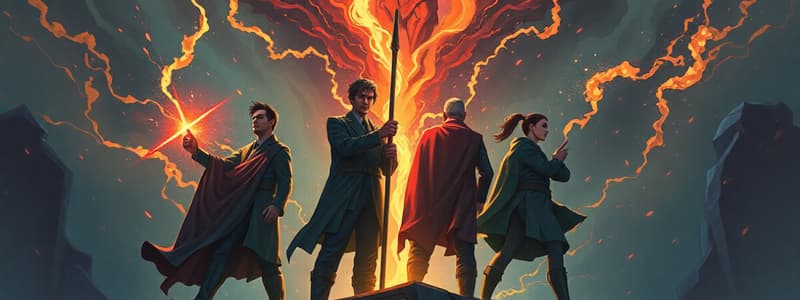Podcast
Questions and Answers
What type of leadership is based on formal position?
What type of leadership is based on formal position?
- Transformational Leadership
- Assigned Leadership (correct)
- Emergent Leadership
- Participative Leadership
Which power is derived from an individual's perception of value by their followers?
Which power is derived from an individual's perception of value by their followers?
- Coercive Power
- Reward Power
- Personal Power (correct)
- Legitimate Power
Which of the following is NOT identified as a key trait of effective leaders in the trait approach?
Which of the following is NOT identified as a key trait of effective leaders in the trait approach?
- Self-confidence
- Intelligence
- Determination
- Creativity (correct)
What distinguishes leadership from management?
What distinguishes leadership from management?
The modern perspective on leadership suggests what?
The modern perspective on leadership suggests what?
What is one of the key weaknesses associated with the trait approach to leadership?
What is one of the key weaknesses associated with the trait approach to leadership?
According to the skills approach, which of the following components is NOT included in the three-skill model?
According to the skills approach, which of the following components is NOT included in the three-skill model?
Which aspect of leadership does the skills approach take into account?
Which aspect of leadership does the skills approach take into account?
What does the trait approach emphasize about leaders?
What does the trait approach emphasize about leaders?
Which factor contributes to the subjective interpretation of leadership traits?
Which factor contributes to the subjective interpretation of leadership traits?
Study Notes
Leadership Definition and Approaches
- Leadership is a process where an individual influences a group to achieve a common goal.
- Leadership can be assigned (based on formal position) or emergent (based on actions and follower support).
- Traditional view of leadership: an inherent trait.
- Modern perspective: Leadership as a learnable skill.
- Trait Approach: focuses on innate qualities of leaders like intelligence, self-confidence, determination, integrity, and sociability.
- Skills Approach: emphasizes skills and abilities that can be learned and developed, including technical, human, and conceptual skills.
Power in Leadership
- Power is the potential to influence.
- Position power - derived from an organizational role.
- Personal power - derived from followers' perception of the leader's value.
- Position Power: Includes legitimate, reward, coercive, and information power.
- Personal Power: Includes referent and expert power.
Leadership vs. Management
- Management focuses on planning, organizing, staffing, and controlling.
- Leadership focuses on influence and change.
Strengths of the Trait Approach
- Intuitive appeal, fits societal perception.
- Extensive research backing.
- Focuses on understanding the leader's role.
- Practical applications for aspiring leaders.
Weaknesses of the Trait Approach
- Lack of definitive traits, inconsistent research.
- Ignores the situation and its influence on leadership.
- Subjective interpretation of traits.
Creon's Isolation in Antigone
- Creon's refusal to engage with others leads to his isolation.
- He rejects the pleas of Antigone, the Chorus, Haemon, and Tiresias.
- This emphasizes the importance of dialogue and understanding diverse perspectives in leadership.
The Captain's Moral Dilemma in The Secret Sharer
- The captain faces a difficult moral dilemma when Archbold accuses Leggatt of murder.
- He decides to protect Leggatt, challenging his own ethical boundaries.
- The captain's leadership is affected by his secret and the stress it creates.
- The captain develops a plan to get Leggatt off the ship, demonstrating his commitment to taking responsibility despite the risks.
Jerry's Reflections on His Role Model in The Remains of the Day
- Jerry feels guilty about his past relationship with Vesta, believing he failed to meet her needs.
- He questions his ethics and his treatment of others, recognizing his own biases and shortcomings.
- Jerry's experiences with Vesta have forced him to confront his own vulnerabilities and the importance of empathy and compassion.
- He seeks to use his privilege and resources to make a positive impact through his business and community involvement.
Taking Responsibility
- The captain takes responsibility by taking small steps forward, demonstrating competency and building credibility with the crew.
- Responsibility is a burden that the captain must bear, even if it's a difficult one.
- Effective leaders respond with action, not avoidance.
Role Model's Impact
- Role models can offer "gifts of discomfort" that challenge our preconceived notions and help us grow as individuals.
- Vesta is not simply an ideal, but a complex individual who challenges Jerry to confront his own flaws.
- Role models help us see the world differently, understand ourselves better, and make a positive impact.
Studying That Suits You
Use AI to generate personalized quizzes and flashcards to suit your learning preferences.
Related Documents
Description
Test your knowledge on the definitions and approaches to leadership. Explore different theories, power dynamics, and the distinction between assigned and emergent leadership styles. This quiz will help you understand the traits and skills that contribute to effective leadership.




